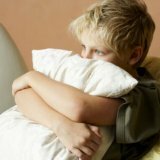Nature of children's fears

Most parents believe that depression, neuroses and fears are exclusively the prerogative of adults, that such emotions are completely alien to children. But children can also experience excitement, despair and fear. Often we accept such fears for stupid children's pranks or self-willed whims. But the children themselves treat them very painfully and seriously. About what the nature of children's fears is and how to cope with them will be discussed below.
What usually scares children
Children's fears are quite diverse. But in order for a child to have a very strong fear, a special reason or impetus for its occurrence is needed. As such jerks often quarrels and scandals between parents, their careless words or casual phrases, watching children of horror films, terrible and aggressive cartoons, unexpected excessively loud sounds or strange things appear. Often parents are directly guilty of the fears of their child. Thus, statements about the various "baba" are the cause of the development of many fears in children.
Children perfectly adopt the emotional state of their parents, which often translate into themselves. If an adult is scared, then it will quickly pass to the child. It is important to be able to remain calm and try to restrain in the presence of the child. In the younger preschool age, fear of pain or hospital may manifest itself, which often occurs after a visit to a doctor. Also often there is a fear of various fairy-tale characters. If you are reading fairy tales to a child, try to soften the image of the negative hero as much as possible.
Older children are afraid of more serious things. Already at a younger school age, they begin to realize the real possibility of the death of someone from their relatives or their own. They are sometimes very worried about the possibility of losing loved ones. Such fear can engulf the child completely. Very adult children are faced with fear of mistakes, condemnation, loss.
What to do if a child is afraid of
Do not abuse children for their fear - this will only worsen the situation. A shy child can lock up. In addition, fear of punishment will add to all other fears. As a result - neurosis, stammering or enuresis. First, it is important to learn how to distinguish ordinary fears from phobias. Ordinary fears occur frequently and quickly pass. Just remove from the child those objects that cause fear. Explain to him that they do not threaten his life or health. Prove it to the child in some way. However, do not take radical measures. If, for example, a child is afraid of the dark, you can not leave him in a room without light. This will not eliminate, but, on the contrary, will increase the feeling of fear. In this way it is easy to bring the child to hysterics. Remember your childhood. Surely you were also afraid of something. Do not treat your child as you would not want to be treated.
Try to ensure a calm and friendly environment within the family. Never quarrel in front of a child. Tell him tales that do not cause him a sense of fear, do not allow watching violent films that provoke the appearance of fear. Talk with your child about what scares him - make him calm. For example, if he is afraid of your death, that he will remain completely alone, do not promise him that this will never happen. Better explain to him that make every effort to make it happen as late as possible. It is difficult for young children to submit any specific deadlines, so this explanation is quite satisfactory.
If the child's fear does not pass or even intensifies, it will be better to consult a specialist. A child psychologist can help solve the problem much faster. And the main thing is to avoid unpleasant consequences. The main thing to understand is that the fears of children - a phenomenon quite normal. Talking about them as a deviation, you can only if they do not allow the child to develop normally. However, even with such problems you can cope with the right approach.



